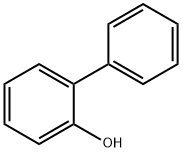90-43-7

Product Name:
2-Phenylphenol
Formula:
C12H10O
Synonyms:
o-Phenylphenol;2-Diphenylol, 2-Phenylphenol, 2-Hydroxydiphenyl;2-Hydroxybiphenyl;Biphenyl-2-ol
Inquiry
CHEMICAL AND PHYSICAL PROPERTIES
| Physical Description | 2-phenylphenol appears as light lavender crystals or solid. (NTP, 1992) |
|---|---|
| Color/Form | Needles from petroleum ether |
| Odor | Mild characteristic odor |
| Boiling Point | 527 °F at 760 mmHg (NTP, 1992) |
| Melting Point | 131.9 to 135.5 °F (NTP, 1992) |
| Flash Point | 255 °F (NTP, 1992) |
| Solubility | less than 0.1 mg/mL at 68.9 °F (NTP, 1992) |
| Density | 1.213 at 77 °F (NTP, 1992) - Denser than water; will sink |
| Vapor Pressure | 1 mmHg at 212 °F (NTP, 1992) |
| LogP | log Kow = 3.09 |
| Stability/Shelf Life | Stable at normal conditions. |
| Autoignition Temperature | Ignition temperature: >=520 degree C |
| Decomposition | When heated to decomposition it emits acrid smoke and irritating fumes. |
| pH | pH = 6.1 in aqueous solution at 22.7 °C |
| Ionization Efficiency | Negative |
| Dissociation Constants | pKa = 9.55 at 22.5 °C |
| Kovats Retention Index | 1456 1491 1494 1507.8 1466 1487 259.6 |
| Other Experimental Properties | VAPOR PRESSURE: 1 MM HG @ 100.0 °C |
| Chemical Classes | Other Classes -> Other Aromatic Compounds |
SAFETY INFORMATION
| Signal word | Danger |
|---|---|
| Pictogram(s) |
 Corrosion Corrosives GHS05  Exclamation Mark Irritant GHS07  Environment GHS09 |
| GHS Hazard Statements |
H315:Skin corrosion/irritation H318:Serious eye damage/eye irritation H335:Specific target organ toxicity, single exposure;Respiratory tract irritation H410:Hazardous to the aquatic environment, long-term hazard |
| Precautionary Statement Codes |
P261:Avoid breathing dust/fume/gas/mist/vapours/spray. P264:Wash hands thoroughly after handling. P264:Wash skin thouroughly after handling. P273:Avoid release to the environment. P280:Wear protective gloves/protective clothing/eye protection/face protection. P302+P352:IF ON SKIN: wash with plenty of soap and water. P305+P351+P338:IF IN EYES: Rinse cautiously with water for several minutes. Remove contact lenses, if present and easy to do. Continuerinsing. |
COMPUTED DESCRIPTORS
| Molecular Weight | 170.21 g/mol |
|---|---|
| XLogP3 | 3.1 |
| Hydrogen Bond Donor Count | 1 |
| Hydrogen Bond Acceptor Count | 1 |
| Rotatable Bond Count | 1 |
| Exact Mass | 170.073164938 g/mol |
| Monoisotopic Mass | 170.073164938 g/mol |
| Topological Polar Surface Area | 20.2 Ų |
| Heavy Atom Count | 13 |
| Formal Charge | 0 |
| Complexity | 149 |
| Isotope Atom Count | 0 |
| Defined Atom Stereocenter Count | 0 |
| Undefined Atom Stereocenter Count | 0 |
| Defined Bond Stereocenter Count | 0 |
| Undefined Bond Stereocenter Count | 0 |
| Covalently-Bonded Unit Count | 1 |
| Compound Is Canonicalized | Yes |
PRODUCT INTRODUCTION
description
2-phenylphenol appears as light lavender crystals or solid. (NTP, 1992)
